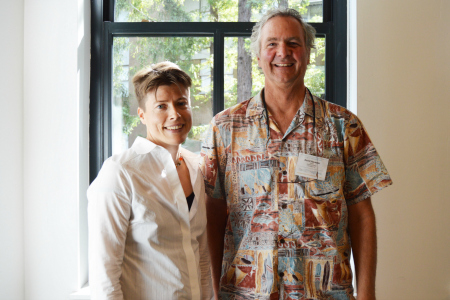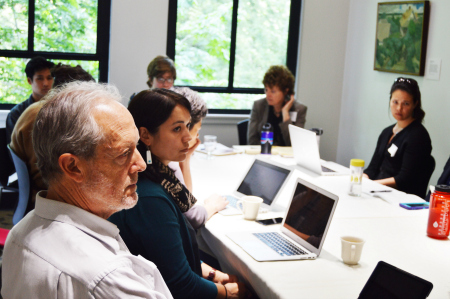Managing big biodata and health equity were some of the hot issues debated at Just Data? Justice, Knowledge and Care in an Age of Precision Medicine, a collaborative meeting to shape the science and justice agenda in the age precision medicine.
On May 18 and 19, experts from the nation’s leading research institutions, healthcare providers and medical groups gathered to discuss the ethical questions and practical implications of precision medicine - a practice that uses vast amounts of data from similar groups or types of people to prognose, prevent, and even predict health outcomes for individuals.
“Data and what we do with data—algorithms—are moving heart of decision-making practices—whether in science, law, policing, or medicine. How will this change our lives? Whose lives? What form of life will we create,” asked Jenny Reardon, Director of the Science and Justice Research Center at UC Santa Cruz and conference co-organizer.
For precision medicine to work, bigger is better say experts. Scientific researchers and institutions are calling for more bioinformatics and are asking patients to donate DNA samples, blood, and tissues in the hopes of building knowledge for the public good.
But the system is “broken,” said conference participants.
Patients do not trust the system to use data appropriately, said Robert Deegan-Cook of Duke University. “The system is terribly broken,” he described.
“It is all about the connectivity of information,” said David Haussler, Scientific Director of the Genomics Institute who urges for increased data sharing. “That information will be part of a system of better understanding in precision medicine. But only if that information is available in the first place.” he added.
Understanding data sharing - and its risks
But once data is available, how will that information be managed, distributed, and shared?
“Data is one thing, but implementation of that knowledge is another,” said Peter Yu, a Director of Cancer Research at Palo Medical Foundation.
Others at the conference questioned how medical data will be used, asking when, where, how, and most critically: by and for whom?
As precision medicine expands, many people are still left out of its benefits, said Laura Mamo, Associate Director of the Health Equity Institute at San Francisco State University.
Similarly, Emily Vasquez from Columbia University emphasized the social problems that arise from the unequal distribution of treatment. She pointed to the famous case of Henrietta Lacks, whose infamous cell line has saved millions of lives. Meanwhile, her grandchildren cannot afford the treatments that resulted thanks to their grandmother’s biodata.
How to balance competing pressures of use, access and monetization of biodata was a tension that ran throughout the talks.
“Data is power,” said Atul Butte, Director of the Institute for Computational Health Sciences at the University of California, San Francisco He said there are businesses who don’t want to share the information they discover, especially when there is money being made out of of waste and inefficiencies.
Accountability and a social contract
Because of this power, conference participants called for a more substantive governance system.
“There are deep societal issues at stake,” said Reardon. “We need to invest in new and innovative cross-institutional structures that effectively govern health research and bio-data collection,” she said.
“Accountability is really important,” emphasized John Mattison, Chief Medical Officer and Assistant Medical Director for Kaiser Permanente.
Reardon, and others at the conference, called for forging a social contract that could guide how data is used and for what ends. It would set the terms between private profit and public good, and would include the fair distribution of health services that result from sharing data and bioinformation.
Taking action in the age of precision medicine
There needs to be an established way to collaborate and share so that lives can be saved, said Haussler. He made a pitch for data stewards, a public or private broker that serves as a conduit between participant and researchers. He emphasized this would a person someone could trust.
Cook-Deegan suggested constructing a public database so useful that it overwhelms the private domain.
Other ideas from the conference’s breakout sessions included a reality television show about science, a curriculum for K-12 students, a video game, a data protection agency, a way to bring social sciences to STEM research and educators, and how to bring block chaining to genomics.
“We live in times when the promises of science and technology meet the fundamental challenges of social justice, we must find ways to collectively address this crucial contemporary conjunction,” said Reardon.


